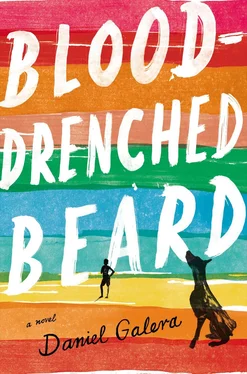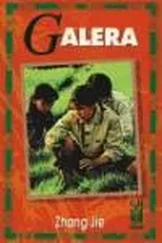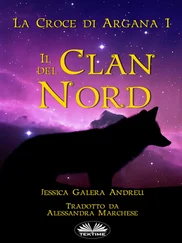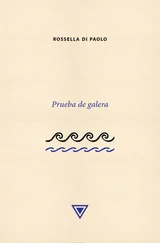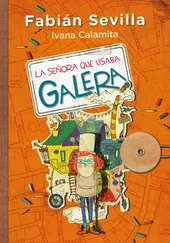Do you want me to unplug it?
No, champ, thanks, but it won’t be necessary.
The fisherman somehow manages to reestablish the electrical current by fiddling with his pocketknife in the cable. The soldering gun starts droning and spraying sparks again in the bowels of the boat. The job is quick. Marcelo pulls the plug from the socket and tosses the rolled-up power cable to the man on board. The man takes the cable, collects up his tools, jumps from the whaler into a rowboat, and joins the other men on the rock. He turns out to be the owner of the whaler and is burly, with a sparse beard, curly hair, and impassive facial expression. He introduces himself as Jeremias. He thanks him for the use of his socket with a handshake and says that tonight they are going to sail south, looking for a school of croakers that was sighted in Itapirubá, and that they’ll bring him some croakers the next morning to return the favor.
Jeremias and another fisherman use the rowboat to take one corner of the fishing net to the deck of the whaler. The net is attached to a crank-operated reel, and with the help of this mechanism, they begin to transfer it from the top of the rock to the whaler.
He offers the fishermen water, coffee, and sandwiches, but they don’t want anything. He asks how long the net is. Marcelo says it is two thousand fathoms, but he doesn’t know what that is in yards. A young man with blue eyes who has been quiet until now says that it’s about one and a half miles. It’s a small net. They often use nets that are three miles long or more. They get enthused and start telling the newcomer stories. Last year this boat came back up to its eyes in water. Eleven tons of croakers. It was riding so low that water was washing over the top of it, and they had to bail it out with buckets. They all hold their cheap cigarettes with the tips of their fingers, and when they aren’t taking a puff, they keep their hands behind their backs, as if they want to hide the fact that they smoke. They are wearing faded sweatshirts and rubber boots or worn-out sneakers.
You live there? Marcelo asks with a jerk of his head.
I moved in yesterday.
You surf?
No.
What happened then? Get divorced?
I just wanted to live by the beach.
Right you are. Life’s good here. This place is beautiful.
It is.
It’s peaceful. To see the ocean in the morning.
It’s priceless.
Everyone here is really nice. Did you know no one’s ever been killed here in Garopaba?
Never?
Lots of folk have died, of course, but there have never been any murders! It’s really laid-back. There’s almost no violence.
I don’t believe no one’s ever been murdered here.
Marcelo doesn’t answer. The tiny waves tickle the still air.
I heard my granddad died here.
What was his name?
People used to call him Gaudério.
No one says anything, in a way that says a lot. He decides to carry on.
The story I heard is that he was murdered here.
Here? How? I don’t think so.
But that’s what my dad said.
They called him Gaudério, did they? Gauchos are pretty common in these parts.
The blue-eyed young man’s lips curve up in a private smile, and he continues staring out to sea.
My granddad used to go spearfishing for grouper. Ever heard of him?
Marcelo raises his eyebrows and turns his head theatrically from side to side. He is squatting at the top of the stairs like a bird on a perch, hugging his knees with one arm, and smoking with the other. He stares deliberately straight ahead and keeps quiet. The conversation runs dry, and everyone looks more concentrated than necessary on whatever it is that they are doing. A couple of tourists glide between the boats on kayaks, the man stopping every so often for the woman to catch up. A cloud covers the sun. The weather is beginning to turn.
You from Porto Alegre? Marcelo breaks the silence.
Yep.
Porto Alegre is really violent.
True.
I lived there for two years. Long time ago. I know it well.
Yeah? What did you do there?
A bit of this, a bit of that. Do you know Bar João?
The one over on Osvaldo?
That’s the one. It was wild. That was my haunt.
It’s not there anymore. They tore it down.
Really? Well, there you go. I used to drink jaguar milk there. They also had cachaça with a brick in it. There was a guy who used to drink it. The place was full of crazies. And a few bad folk too.
I used to live in Porto Alegre too, says the oldest of the group. He is a thin, wrinkled man with enormous ears with tufts of white hair growing out of them. I spent ten years there. Back then I worked in a bar. Remember the trams? Did you ever see a tram in Porto Alegre? Right, you’re too young for trams. They got rid of the trams in ’seventy-one. There were trams going up and down Cristóvão Colombo and several other streets. You could go all over the place on them. They auctioned them off, and the owner of the bar I worked at bought one. He took off the front of the carriage with a blowtorch and stuck it on the front of the bar. The place was small. It fit perfectly. Know the place?
No. I think I was a kid.
The old guy doesn’t continue his story. There is an anticlimactic silence. The owner of the whaler is still on board winding up the net with the crank.
Jeremias!
The fisherman raises his head.
Ever heard of a guy who lived here in the sixties called Gaudério?
Gaudério?
He was my granddad. I’m trying to find someone who knew him.
Mustn’t be from my time, says Jeremias, without taking his eyes off the net. Try talking to someone who’s been around longer. Lots of folk pass through here. Most end up being forgotten.
Marcelo tosses his cigarette butt into the water and gets up.
I’m off.
Jeremias finishes winding up the net minutes later, and they all get on the whaler. The motor coughs out puffs of gray smoke. The boat advances with its propeller gurgling to a point farther out and is anchored. The smell of fuel hangs in the air.
He goes inside. Beta is prostrate, in the same position as the day before, lying on her favorite towel, and as is often the case, he can’t tell if she is asleep or awake. She breathes very slowly and needs a lot of encouragement to go out for walks. He sets her dishes of water and food in the outside laundry area, which at least forces her to get up to eat.
He gets his wallet from a drawer in the kitchen cupboard. Among his documents and bank cards is a recent passport-size photograph of himself, one of those neutral, bureaucratic photographs whose only function is facial recognition. He is in the habit of carrying this kind of photo around so he can remember his own face, since the photos on his driver’s license and ID card are too small and too out of date, respectively, for this purpose. He takes the photo out of its plastic envelope. He goes into the bedroom, opens his backpack of personal belongings, and takes out his most cherished photo album, the one that serves almost as a catalog of the faces of the greatest sentimental importance to him. He finds the photograph of his grandfather that his father gave him and compares it to his passport photo. Then he goes into the bathroom and holds the photo of his grandfather next to the mirror.
He looks back and forth at his grandfather’s face and his own reflection. He runs his hand over the beard that he has been growing ever since he spoke to his father for the last time. He finds a pair of blunt, slightly rusty scissors in the silverware drawer and, with some difficulty, cuts his grandfather’s portrait down to the size of an ID card and places it in the same plastic envelope in his wallet where he has kept his own picture until now.
Читать дальше
